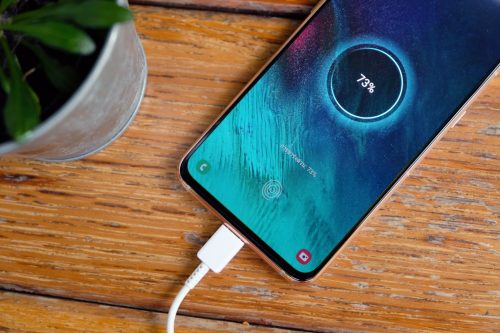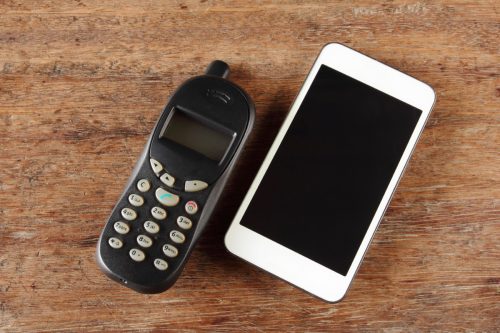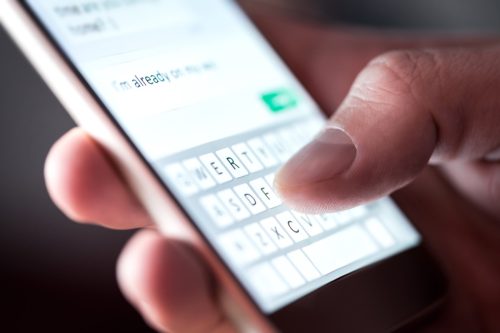Cell Phone Use Drastically Affects Your Sperm Count, New Study Finds
Researchers collected data and samples from nearly 3,000 men.

We've all heard tell of the downsides of being attached to our phones: Of course, there's the impact on your mental health and relationships, but there's also the possibility of developing the dreaded "tech neck." Now, researchers from the University of Geneva (UNIGE) in Switzerland found that high cell phone use could have another drawback: lowering your overall sperm count. Read on to find out the latest research, and why you or the men in your life might want to put down the phone.
RELATED: Common Statin Spikes Diabetes Risk, New Study Finds.
Swiss researchers tracked sperm count over 13 years.

A new study published in Fertility and Sterility evaluated 2,886 men between the ages of 18 and 22 from the Swiss population. Participants were recruited between 2005 and 2018 while they were in the military, delivering semen samples for study and answering a questionnaire about their health and lifestyle.
During the questionnaire, participants were asked about the number of hours they spent on their phones and where they kept their devices when not in use. In total, 2,759 men answered the question about mobile phone use, and 2,764 gave details about where they kept their phone, allowing researchers to draw connections between these two factors and sperm count.
RELATED: New Study Reveals Harsh Truth About Taking Xanax for Anxiety.
Those who used their phone more often fared worse in terms of sperm count.

According to the findings, sperm count and sperm concentration were "significantly higher in the group of men who did not use their phones more than once per week."
For men who said they used their phones 20 times or more each day, researchers concluded they had a 21 percent higher risk of low overall sperm count. Avid phone users also had a 30 percent higher risk for lower sperm concentration, which is sperm count in a milliliter of semen. (Researchers defined "lower" sperm count and concentration as levels falling below the World Health Organization's [WHO] benchmarks for fertile men.)
Men who used their phones more often were also found to weigh more and have a higher body mass index (BMI), and more of these participants reported smoking cigarettes and drinking alcohol.
There were some encouraging findings, too.

Given how integral cell phones are to our daily lives, this data may be disconcerting. However, the news isn't all bad—according to the study results, keeping a mobile phone in one's pants pocket wasn't associated with lower sperm counts.
Additionally, researchers found no consistent association between mobile phone use and sperm motility (the ability to move on its own) or the size and shape of the sperm. As Alison Campbell, chief scientific officer of Care Fertility, told CNN, this point shouldn't be overlooked.
"Whilst sperm numbers matter, the ability of sperm to swim, have healthy intact DNA and be the right shape, is at least as important," she said.
RELATED: 4 Red Flags About Your Partner's Cell Phone Use, According to Therapists.
Changing technology also influenced results over the years.

Another interesting aspect of the study was that the association between phone use and sperm count became weaker over the 13 years of study. According to researchers, the link was most pronounced between the first study period (2005-2007), then gradually decreasing between the latter study periods (2008-2011, and 2012-2018).
Researchers wrote that this is "in line with the transition to new technologies, mainly from 2G to 3G to 4G, and the corresponding decrease in the phone's output power."
As researcher Martin Roosli, an associate professor at Swiss Tropical and Public Health Institute, explained to Forbes, phones can heat up when using energy to send and receive signals, and this energy is what researchers have posited is connected to sperm quality. However, newer networks require less power to transmit signals, meaning it could also have less of an effect on sperm.
At the same time, researchers say that additional study is needed to evaluate the impact of new phone technologies, as their study only "represents a snapshot" of cell phones' impact.
We still don't have concrete answers.

While the present study is the largest cross-sectional study on this topic, research on falling sperm count is not new. Some data suggests that over the last 50 years, sperm count has fallen roughly 50 percent globally—and no one is exactly sure why, CNN reported.
"Previous studies evaluating the relationship between the use of mobile phones and semen quality were performed on a relatively small number of individuals, rarely considering lifestyle information, and have been subject to selection bias, as they were recruited in fertility clinics. This has led to inconclusive results," first author and co-leader of the study Rita Rahban, senior researcher and teaching assistant in the Department of Genetic Medicine and Development in the Faculty of Medicine at UNIGE and at the Swiss Centre for Applied Human Toxicology, said in a press release.
Swiss researchers offered possible answers to questions about fertility, but also noted the limitations of their study. For starters, participants self-reported data, which can lead to errors. In the press release, Rahban also pointed out that while there was no definitive association between where the phone is kept and lower sperm counts, the number of men who said they don't carry their phone close to their body "was too small to draw a really robust conclusion on this specific point."
RELATED: For more up-to-date information, sign up for our daily newsletter.
Best Life offers the most up-to-date information from top experts, new research, and health agencies, but our content is not meant to be a substitute for professional guidance. When it comes to the medication you're taking or any other health questions you have, always consult your healthcare provider directly.





















